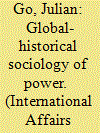|
|
|
Sort Order |
|
|
|
Items / Page
|
|
|
|
|
|
|
| Srl | Item |
| 1 |
ID:
124763


|
|
|
|
|
| Publication |
2013.
|
| Summary/Abstract |
Michael Mann's long-anticipated volumes, the sources of social power, volume 3: global empires and revolution, 1890-1945 and the sources of social power, volume 4: globalizations, 1945-2011 complete Mann's career-spanning project. Compared to previous volumes in the series, these works are much more global in scope. They address topics such as global wars, empires, social citizenship across the industrialized world, economic recessions and climate change. In this way they rectify omissions in Mann's previous work, even while continuing to deploy Mann's previous IEMP (ideological, economic, social, political) model of power. However, three shortcomings remain: first, the books do not adequately deploy the concept of society as power networks; second, they do not offer a conceptualization of global systems or dynamics beyond the sum total of actions by individual states or actors; and third, they retain the standpoint of power in their analyses. Despite these shortcomings, these volumes offer a masterful global history of power over the past century and a half and make long-lasting contributions to the historical sociology of power.
|
|
|
|
|
|
|
|
|
|
|
|
|
|
|
|
| 2 |
ID:
137745


|
|
|
|
|
| Summary/Abstract |
The fourth volume of Michael Mann’s The Sources of Social Power is the last in his historical sociological series, which has centred on an analysis of ideological, economic, military and political power in human societies from the start of civilisation. Mann’s final volume provides an important overview of the period of American hegemony and its worldwide effects, the rise and crisis of neoliberalism, the contrasting fates of the USSR and Maoist China, the vagaries of American empire, and modern revolutions. The implications of his study, particularly regarding the history and theory of revolutions, are of the utmost value to anyone on the Revolutionary Left today, especially in the Third World. While Mann’s study is primarily focused on the West, it provides important lessons to be drawn for the Third World.
|
|
|
|
|
|
|
|
|
|
|
|
|
|
|
|
| 3 |
ID:
138964


|
|
|
|
|
| Summary/Abstract |
This paper examines the 228 Uprising, which occurred in February 1947 in post-war Taiwan, employing Michael Mann’s IMEP model as the primary analytical framework and suggesting that the uprising was in nature an ethnic conflict heavily influenced by at least four types of structural factors: political, military, economic and ideological. This paper attempts to answer the following questions: What were the structural factors that contributed to the 228 Uprising? How should we interpret these factors to understand the nature of the uprising? Why did the Taiwanese people who participated in the riots act so violently against the provincial government in Taiwan? Factionalism and a low level of the state power were serious political problems, which resulted in lax military discipline and a failed statist economic policy. These military and economic conditions fuelled ideological discourses that called for democracy and self-governance by the Taiwanese. Moreover, the negative interactions between the Taiwanese and the Mainlanders contributed to the emergence of a Taiwanese ethnic identity and echoed those discourses. It can be argued that Taiwanese elites and masses fused their ethnic identity with their ideal of democracy. Thus, in the eyes of many Taiwanese participating in the uprising, that fusion justified violent actions against Chen Yi’s provincial regime and the military establishment in Taiwan.
|
|
|
|
|
|
|
|
|
|
|
|
|
|
|
|
|
|
|
|
|